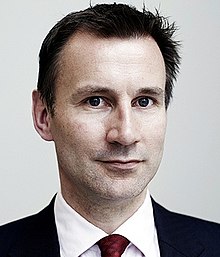Jeremy Hunt (politician)
|
The Right Honourable Jeremy Hunt MP |
|
|---|---|
 |
|
| Secretary of State for Health | |
|
Assumed office 4 September 2012 |
|
| Prime Minister |
David Cameron Theresa May |
| Preceded by | Andrew Lansley |
| Secretary of State for Culture, Olympics, Media and Sport | |
|
In office 12 May 2010 – 4 September 2012 |
|
| Prime Minister | David Cameron |
| Preceded by |
Ben Bradshaw (Culture, Media and Sport) Tessa Jowell (Olympics) |
| Succeeded by | Maria Miller (Culture, Media and Sport) |
| Shadow Secretary of State for Culture, Media and Sport | |
|
In office 2 July 2007 – 11 May 2010 |
|
| Leader | David Cameron |
| Preceded by | Hugo Swire |
| Succeeded by | Ben Bradshaw |
| Shadow Minister for the Olympics | |
|
In office 2 July 2007 – 11 May 2010 |
|
| Leader | David Cameron |
| Preceded by | Hugo Swire |
| Succeeded by | Tessa Jowell |
| Shadow Minister for Disabled People | |
|
In office 6 December 2005 – 2 July 2007 |
|
| Leader | David Cameron |
| Preceded by | Paul Goodman |
| Succeeded by | Mark Harper |
|
Member of Parliament for South West Surrey |
|
|
Assumed office 5 May 2005 |
|
| Preceded by | Virginia Bottomley |
| Majority | 28,556 (49.8%) |
| Personal details | |
| Born |
Jeremy Richard Streynsham Hunt 1 November 1966 London, England |
| Political party | Conservative |
| Spouse(s) | Lucia Guo (2009–present) |
| Children | 3 |
| Alma mater | Magdalen College, Oxford |
| Website |
Party website Personal website |
Jeremy Richard Streynsham HuntPC MP (born 1 November 1966) is a British Conservative Party politician who has been the Secretary of State for Health since 2012 and the Member of Parliament for South West Surrey since 2005. He was previously Culture Secretary (2010–12).
Hunt was born in Kennington and studied Philosophy, Politics, and Economics at Magdalen College, Oxford, where he was president of the Oxford University Conservative Association. As Culture Secretary, Hunt spearheaded the drive for local TV, resulting in Ofcom awarding local TV licences to several cities and towns. Hunt also oversaw the 2012 London Olympics, which received widespread acclaim.
As Health Secretary, Hunt was responsible for negotiating a new contract for junior doctors. The proposed contract increased basic pay while reducing the hours that qualified for premium pay, including reclassifying Saturday as "normal hours". Negotiations with the doctors' union, the British Medical Association (BMA) initially failed, resulting in multiple strikes in 2016. An agreement was eventually reached in May 2016 between the BMA leadership and the government. In a subsequent referendum, junior doctors rejected the new contract and in response Hunt imposed the contract in October 2016. During the dispute, the editor of the British Medical Journal, statisticians and the BMA council chair, amongst others, said that Hunt had misrepresented research to support his claim that a lack of adequate staffing in the National Health Service at weekends had led to avoidable deaths.
...
Wikipedia
